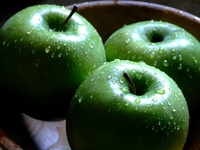 Organic fruits and vegetables are gaining ground in the food industry as a healthy alternative to produce that may have been grown with harmful pesticides and other chemicals. Unfortunately, however, this lack of chemical additives sometimes leaves organic produce susceptible to food-borne pathogens and microbes, which can cause illness in humans.
Organic fruits and vegetables are gaining ground in the food industry as a healthy alternative to produce that may have been grown with harmful pesticides and other chemicals. Unfortunately, however, this lack of chemical additives sometimes leaves organic produce susceptible to food-borne pathogens and microbes, which can cause illness in humans.
In an effort to increase the safety of distributing and eating organically grown produce, scientists at Washington State University are using ultraviolet C (UVC) light to destroy illness-causing bacteria on organic fruit.
The recent study, which was conducted by food safety specialist Shyam Sablani and his colleagues at WSU, found that UVC is effective against foodborne pathogens on the surface of certain fruits, and may offer a safe alternative to chemical sanitizers.
UVC light, which has a shorter wavelength than ultraviolet A or B light, works by destroying the nucleic acid and disrupting the DNA within the fruit-dwelling microorganisms, and can be effective in sanitizing surfaces as well as drinking water and contaminated air.
 “UVC radiation is present in sunlight; however, it is completely absorbed by the ozone layer and Earth’s atmosphere” Sablani explained. “It has germicidal properties and can be effective against bacteria, mold and viruses.”
“UVC radiation is present in sunlight; however, it is completely absorbed by the ozone layer and Earth’s atmosphere” Sablani explained. “It has germicidal properties and can be effective against bacteria, mold and viruses.”
After conducting studies on a variety of organic fruits, the scientists found that UVC was most effective on apples and pears at destroying E. coli and listeria bacteria.
“If you have smoother skinned fruit, then this technology is really great,” Sablani said. “If the fruits are very rough and if the level of contamination is low, it also works quite well.” “Interest in this technology is high because it’s simple to implement and inexpensive,” he said.
According to the researchers, adding UVC treatments to organic fruit processing lines is a relatively easy and cost-effective procedure, and would greatly increase food safety of several varieties of organic fruit.
With important projects concerning food safety and a variety of other fields of research, Washington State University is a leading institution for the advancement of science. In addition to this study, scientists at WSU are recognized for their work in microbiology, agriculture, pharmacology, and many other important science departments. For this reason, scientists at WSU receive large amounts of funding to subsidize their research efforts.
For example:
- WSU received over $20M from the National Institutes of Health in 2014
- Washington State University, Pullman is nearing its $1 billion goal to raise new funding for research and operations.
- Washington State University has endowment assets worth $476 million.
- $52.9 million funding is being awarded through the 2013-15 Capital Budget Proposed Substitute House Bill 1089 for the Clean Technology Laboratory at Washington State University.
Many scientists at WSU have active projects that require regular access to new lab equipment, and the funding to purchase it. Every year, these researchers head to the BioResearch Product Faire™ in order to network and procure these important lab supplies.
 Last year, the BioResearch Product Faire™ Event at Washington State University attracted 230 attendees from 23 different research buildings and 30 on-campus departments.
Last year, the BioResearch Product Faire™ Event at Washington State University attracted 230 attendees from 23 different research buildings and 30 on-campus departments.
This year, Biotechnology Calendar Inc. is proud to host these researchers and more at the 16th Annual BioResearch Product Faire™ at WSU in Pullman, Washington on October 14, 2015.
This event hosts Washington State’s researchers, educators and clinicians in a leading life science research marketplace. To learn more about participating, either as a researcher interested in lab supplies, or as a vendor interested in WSU lab sales, click below:
Get regular updates about WSU and other leading life science institutions with Science Market Update:




